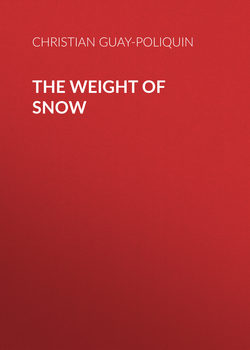Читать книгу The Weight of Snow - Christian Guay-Poliquin - Страница 14
На сайте Литреса книга снята с продажи.
FORTY-TWO
ОглавлениеA crescent moon embraces the black sky. A thick, shiny crust has formed on the snow. In the glow of the night, it is like a calm, shimmering sea.
In the room, the oil lamp casts its light on the walls, sketching out golden shadows. Matthias comes to me with a bowl of soup and a piece of black bread. It is all we eat. The end of one soup is the beginning of the next. When we reach the bottom of the kettle, Matthias adds water and anything else he can get his hands on. When we have meat, he boils the bones and gristle to make broth. Vegetables, dry bread, it all ends up in the soup. Every day, at every meal, we eat that bottomless soup.
Matthias sits at the table, hands clasped carefully, in an attitude of contemplation, as I swallow down as much as I can. Often I finish my meal before he has started his.
At the beginning, Matthias had to force me to eat so I would recuperate and get my strength back. He would help me sit up and feed me patiently, one spoonful at a time, like a child. Now I can lean back on the pillows by myself. The pain and fatigue persist, but my appetite has returned. When he gets his hands on a few litres of milk, he makes cheese with the rennet he found in the creamery in the stable. Sometimes he gives cheese to the villagers, but often it is so good we devour all of it in a few days, right out of the cloth it has drained in.
Getting over my injuries takes a lot of energy. So does evaluating the passage of time. Maybe I should be like Matthias and just say before the snow or since the snow. But that would be too easy.
There has not been electricity for months. At the beginning, I was told, there were blackouts in the village. Nothing too worrisome. People practically got used to it. It would last a few hours, then the power would return. One morning, it did not come back. Not here, and not anywhere else. It was summer. People looked on the bright side. But when autumn came, they had to think about what to do next. As if they had been taken by surprise. It is winter now, and no one can do anything about it. In the houses, everyone gathers around the woodstove and a few blackened kettles.
Matthias finishes his bowl of soup and pushes it toward the centre of the table.
For a moment, nothing happens. I have a particular affection for these time outs that follow our meals.
They do not last long.
Matthias stands, picks up the dishes, and scours them in the sink. Then he wraps the pieces of bread in a plastic bag, folds the clothes that were drying on the line above the stove, extends the wick on the oil lamp, takes out the first aid kit, and brings over a chair.
